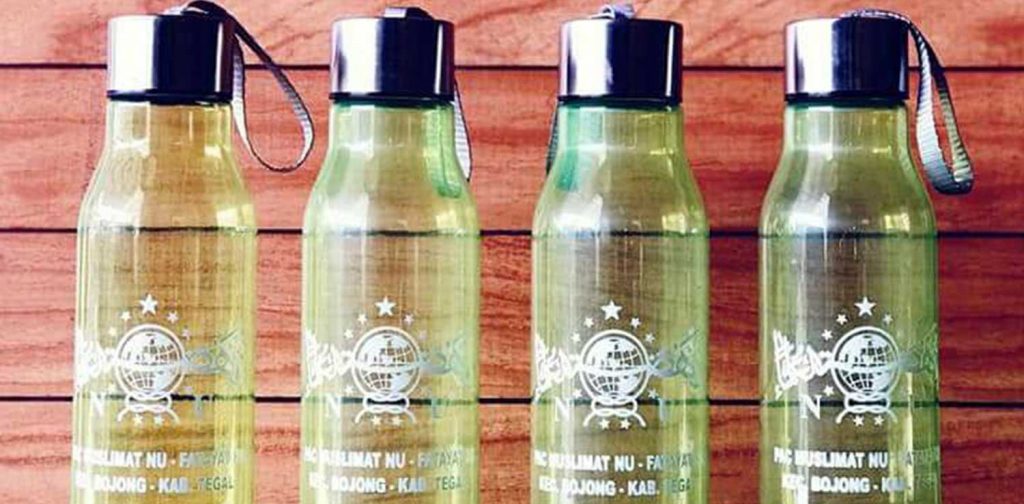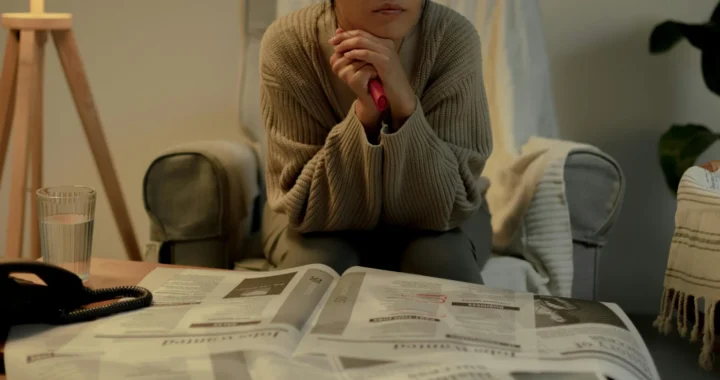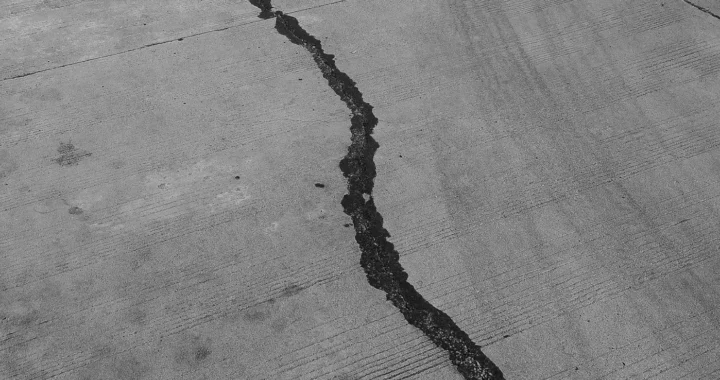Muslimat NU of Bojong-Tegal Campaigns Environmental Protection, Reduces Waste Production

Customized water bottle by Muslimat NU Bojong | Image: Muslimat NU Bojong
Muslimat NU members in Bojong District, Tegal Regency, Central Java Province of Indonesia were anxious about accumulations of waste from their food consumption on the regular coordination and recitation meetings “muzakarah.” They responded to the anxiety by no longer using single-use plastic bottles and styrofoam containers for their muzakarah consumption.
Muslimat NU is the women’s wing organization of Nahdlatul Ulama, the largest Muslim civil society organization in Indonesia. It is a platform for the NU women’s movement to play an active role in social development. They have branches from the village, district, regency, province to the national levels with an estimate of millions of structural and cultural members throughout the country.
Before the Covid-19 pandemic, Muslimat NU of Bojong District’s muzakarah used to be held routinely every Sunday Kliwon morning, referring to the Javanese calendar system, attended by hundreds of members from all villages in the district. Since the Covid-19 pandemic, the muzakarah is centralized in the NU Building in the district, and attendance is limited for the core committee only.
“Of course! We do a stringent health protocol during the Covid-19 pandemic,” says Umi Atiqoh, a Muslimat NU member from Tuwel Village in Bojong District, to Green Network.
Before starting that new initiative, Muslimat NU of Bojong District still used single-use plastic bottles and styrofoam containers to serve muzakarah consumption. Since mid-2019, they have decided to move on to a more environmentally friendly consumption practice. Based on the agreement of the members’ deliberations, they initiated a movement to reduce waste production, especially for waste that is hard to decompose in nature.
As a substitute, Muslimat NU of Bojong District uses tumblers and banana leaves. They produce the tumblers then sell them to all members throughout the villages in the district. The profits generated are utilized to fund organizational activities for both the village and district levels.
This initiative has now become one of the flagship programs of Muslimat NU of Bojong District. Now in every muzakarah, all members must bring drinking water from home using their tumblers. The food and dishes are also packed in environmentally friendly banana leaves.
“It is a part of our real action to preserve the environment by reducing single-use containers that generate waste accumulation,” says Bariroh, the Chair of Muslimat NU of Bojong District, when Green Network clarifies the information regarding the initiative.
Waste management is a big challenge in Indonesia. Reducing waste production is a crucial step in the waste management system, while considered to have the most sustainable impact on environmental conservation.
“Anyone who wants to start an environmental conservation initiative, please start from your very self, ibda’ binafsik. Then strengthen your commitment,” Bariroh says.
Editor: Marlis Afridah
Translator: Aliyah Assegaf
To learn the original version of this article in Indonesian, read Green Network ID.

If you find our content useful, please consider subscribing to Green Network Asia.
Your subscription will benefit you personally and professionally and can be your best way to support the creation of these publicly available resources.

Zia Ul Haq
Zia is a Contributing Author at Green Network Asia. He graduated from UIN Sunan Kalijaga Yogyakarta with a bachelor's degree in Islamic Education. He is a Learning Companion at Qaryah Thayyibah Learning Community (KBQT).


 Dark Side of the Light: How light pollution affects people and the planet
Dark Side of the Light: How light pollution affects people and the planet  UK Researchers Propose Foundational Ways for Environmentally Responsible AI
UK Researchers Propose Foundational Ways for Environmentally Responsible AI  Exploring Asia Pacific’s Outlook on Decent Work for All
Exploring Asia Pacific’s Outlook on Decent Work for All  Indonesia-UK Cooperation to Strengthen Marine Conservation
Indonesia-UK Cooperation to Strengthen Marine Conservation  Adult Literacy Skills Are in Decline
Adult Literacy Skills Are in Decline  Global Implementation of Multi-Hazard Early Warning System
Global Implementation of Multi-Hazard Early Warning System